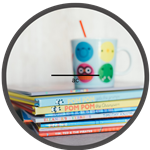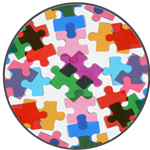Learning in Preschool
-
The environment and arrangement of a classroom sets the tone for how children interact with materials and with one another.
A structured schedule supports children's engagement with activities. A structured schedule supports children's engagement with activities. The schedule allows for educators to plan activities and experiences that will encourage children to make choices and learn independently. The schedule is based on developmentally appropriate practice, which is a research-based approach to learning. Daily schedules give students the opportunity to work in groups or individually, play outside, and explore the classroom environment based on their own interests. Educators facilitate student learning by engaging in meaningful conversations that challenge and engage student thinking and learning.
Our program takes pride in creating a space for young children to learn, grow, and take risks. We strive to connect with families, foster curiosity, and develop a love for learning for all students.
Learning Centers: Each classroom has a variety of learning centers that serve unique purposes for student learning.
 Literacy Center
Literacy Centeracademic focus on:
-
-
-
-
- emergent literacy skills
- vocabulary development
- appreciation of books
- listening skills
- writing skills
- care and responsibility for books and technology equipment
-
-
-
 Art Center
Art Centeracademic focus on:
-
-
-
-
- creative process
- fine motor skills
- visual perception skills
- colors and shapes
- problem-solving
- hand-eye coordination
- color, texture, and line composition
- self-expression of ideas and feelings
-
-
-
 Dramatic Play Center
Dramatic Play Centeracademic focus on:
-
-
-
-
- self-expression
- sensitivity to peers
- social relationships
- improved self-image
- interpreting facial expressions, gestures, and tone of voice
- understanding various roles and responsibilities
- understanding and processing their world and experiences, emotions, feelings, and fears into imaginative activities
-
-
-
 Blocks Center
Blocks Centeracademic focus on:
-
-
-
-
- mathematical and scientific concepts
- social & emotional skill development
- problem-solving
-
-
-
 Mathematic Manipulatives Center
Mathematic Manipulatives Centeracademic focus on:
-
-
-
-
- number sense
- hand-eye coordination
- cognitive problem-solving
- mathematical concepts
- spatial awareness
- measurement
- fine motor & small muscle control
-
-
-
 Nature | Discovery Center
Nature | Discovery Centeracademic focus on:
-
-
-
-
- observational skills
- classification skills
- prediction skills
- care for living things
- the physical & biological world that they live in
-
-
-
 Music & Movement Center
Music & Movement Centeracademic focus on:
-
-
-
-
- creative process
- positive self-esteem
- expression of feelings & emotions
- instruments & sounds | tones
- listening & distinguishing sounds
-
-
-
-

